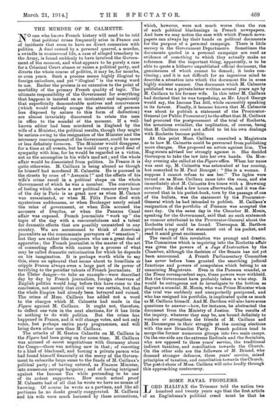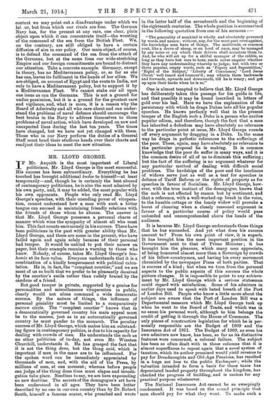SOME NAVAL PROBLEMS.
T ORD HALIFAX the Trimmer told the nation two _LI hundred and twenty years ago that the first article " believeth in the sea." "Without that there needeth no General Council to pronounce him incapable of salvation here." That is as true now as ever it was, or, rather, we may say that its truth has been intensified by modern con- ditions. In the days of William and Mary we could still feed ourselves without keeping the command of the sea. We cannot do so now. Again, in those days it was far easier to improvise a force to repel invasion than it is now. Lastly, the temptation to invade is now far greater. In Halifax's time there was no Empire. Now the British Empire, if the blow at the heart can be given by invasion, affords the richest plunder that the world has ever seen. If we had what we desire, the Swiss Militia system, and the whole of the male population of the country were trained to arms, and thereby conditions were established which would never make it worth anybody's while to put his hand into the hornets' nest, we should have enormously strengthened our sea force by giving it that freedom which every naval strategist desires. No one would then be nervous about letting the enemy have four days' freedom of action in the German Ocean while the Navy was doing some necessary work elsewhere. Yet even then the Navy would still remain our essential line of defence, and the command of the sea would be as vital as ever. But how much more must it be our prime pre- occupation when, instead of making an invasion raid the most hopeless of enterprises even if we were temporarily open to such attack, we pointedly invite the attempt by our want of preparation, and tell the world by deeds, if not by words, that we dare not give our Navy even forty-eight hours' rest from the instant duty of a coast-guard ?
We cannot attempt here to set out in detail the number of new ships we ought to build, or what kind of ships would most help to make us secure. In this matter the public mind is so easily confused by arithmetical calculations that little comes of attempts to deal with them. We can only insist once again on the tremendous responsi- bility that lies upon the Government, and express the hope that they are dealing with the situation without fear of that large and noisy section of their followers which pro- claims it a duty to neglect our naval defence. And here, even at the risk of being accused of partisanship, we cannot but record the great anxiety which we feel when asking ourselves whether the Government have done all that is necessary, or whether they are living from hand to month on a bare naval minimum for fear of annoying too greatly their pacifist followers. One would naturally like to believe that in a matter so essential the Government could be trusted always to resolve the doubt in favour of national safety. But how can we feel sure of this when we remember that only three months ago the Chancellor of the Exchequer —the second man in the Government and the holder of the nation's purse-strings—actually allowed a "con- versation" with himself to be published, in which he in effect became the advocate of the naval reduction party, and used language which must have been intended to weaken the position of the First Lord of the Admiralty in his struggle to make adequate preparations to meet the dangers with which we are faced ? Ten years' experience has shown us that the way to stimulate that German competi- tion for the command of the sea which is the source of all our anxieties, naval and financial, is for our Government to raise signals of distress, or what are, at any rate, sure to be taken in Germany as signals of distress. Yet these were raised in the Chancellor of the Exchequer's " conversa- tion " with the reporter of the Daily Chronicle. Whenever an English statesman in office talks about the crime against humanity of bloated armaments, and the need for agreement with Germany to check them, and the appalling folly and wickedness of burdening the poor with the cost of armaments, our German rivals have always in their hearts, and often on their lips, one comment : "They are getting tired of it ! They are on the point of giving in ! You have only got to press them a little harder, keep up the pace a little longer, and they will collapse, and we shall win the race. Now or never ! One more spurt and we have got the greatest prize that the world can offer."
That is the German translation of our sententious appeals to humanity, and talk of cutting each other's throats. Thab was what happened when poor Sir Henry Campbell-Bannerman, with the best intentions in the world, tried to prove our goodwill and our friendliness to Germany by a pause in our naval preparations. German competition
was at once stimulated, and that confidence which we ought to see maintained in our Navy was shaken—a confidence which would have the effect, not of stimulating, but of depressing German rivalry, and making the German people ask whether a race in which they were sure to be beaten by the Power which had got the start was worth while. Signals of distress made by our Govern- ment, followed, as they inevitably must be, by bitter or anxious criticism from the Opposition, are, in fact, just the things to keep the German naval pot boiling. The front we ought to show to Germany is one of absolutely calm and unruffled determination not only to keep the naval lead we have got, but to increase it. That is the line of action which would not only be worthy of the nation, but would daunt German ambition. If we wanted to egg the Germans on to overspend themselves and to impair their land power by too great additions to their Navy, no doubt we should be playing the game admirably in acting as we are acting. But since no one suggests that such a Machia- vellian policy is being pursued, or ought to be pursued, we stand condemned as people unable to play the great game with calmness and dignity, or to inspire that feeling c,f confi- dence which is the forerunner of success in all human affairs.
A second naval problem to which we desire to call attention is very different. It is the strain on the Navy caused by the new conditions under which it has to work- & problem which, though very serious, is happily free from party politics and for which there is no need to blame the Government. Till within ten years ago the British Navy was not only an Imperial force in fact and in essence, but in distribution. Our ships and their crews spent the greater part of their active sea service in distant waters—in the Indian Ocean, in the Pacific, in the Atlantic, and in the Mediterranean. The ordinary man was far more likely to encounter British warships and British sailors abroad than at home. Now all this is changed. The Fleet, obeying the absolutely sound rule that it must be where the potential enemy is, has become a home-keeping Fleet. The huge German Navy is concentrated in the narrow waters of the German Ocean, and there also, or close by, must our ships be concentrated. The result is that the Fleet now means the Home Fleet, and that our officers and sailors pass their lives in home waters. This change of environ- ment has had, and was bound to have, a far-reaching effect upon all concerned. Owing to the naval tradition that the sailor was entitled to give himself a good time when he was at home, since such luck seldom came his way, home waters came to be regarded as, and to be, expensive for all concerned. The result of home service playing so large a part in the sailor's life has been to make the men restless from the greatest source of restlessness in all classes—namely, expenditure beyond their means. To give a concrete instance of what we mean, far more sailors marry now that the ships are always at home than married in old days. That is an excellent thing in itself, but it necessarily means greater expense for the man. Again, the sailors who do not marry have a great deal more shore leave than formerly, and that means greater opportunities for spending money. The Saturday-to-Monday habit, indeed, is said to be as great a cause of spending among the denizens of the lower deck as among those of Mayfair. No doubt common-sense will ultimately reassert itself, and the Navy will become accustomed to the changed condi- tions, but meanwhile we must expect a certain amount of grumbling and restlessness which will need very careful watching. Let it not be supposed for a moment that we are suggesting that there is danger of a naval mutiny. We shall not see that. But we may, if we are not vigilant, see naval service cease to be as popular as it once was, and a sense that they are not being fairly treated grow up among the men and petty officers.
A further naval problem which we can only touch upon very shortly is also due to the changed conditions in which the Navy finds itself. Though the essentials of naval strategy remain, of course, the same now as ever, what we may call the strategic standpoint has necessarily altered with the concentration of the Fleet in home waters. Naval thinkers have to readjust their focus. But this is a. difficult job and needs time. Until the readjustment has taken place there is necessarily a great deal of bewilder- ment. No doubt in time the best brains of the Navy will be turned to the work of re-estimating naval values, and we shall have a new school of naval strategy. In this
context we may point out a disadvantage under which we kl,ur, but from which our rivals are free. The German Navy has, for the present at any rate, one clear, plain object upon which it can concentrate itself—the wresting of the command of the sea from the British Fleet. We, on the contrary, are still obliged to have a certain diffusion of aim in our policy. Our main object, of course, is to defend the command of the sea from the attack of the Germans, but at the same time our wide-stretching Empire and our foreign commitments are bound to distract our attention. Take a concrete example. Germany, except in theory, has no Mediterranean policy, or, so far as she has one, leaves its fulfilment in the hands of her allies. We are obliged, on account of Egypt and the route to India, not Only to have a Mediterranean policy, but to support it by a Mediterranean Fleet. We cannot stake our all upon one issue as can the Germans. This is not a ground for undue pessimism, but it is a ground for the greatest care and vigilance, and, what is more, it is a reason why the Board of Admiralty and all who care about and can under- stand the problems of naval defence should encourage the best brains in the Navy to address themselves to those problems of naval action, which have developed on new and unexpected lines during the last ten years. The times have changed, but we have not yet changed with them. Those who in our Navy perform the duties of a General Staff must bend their studious heads over their charts and readjust their ideas to meet the new situation.












































 Previous page
Previous page